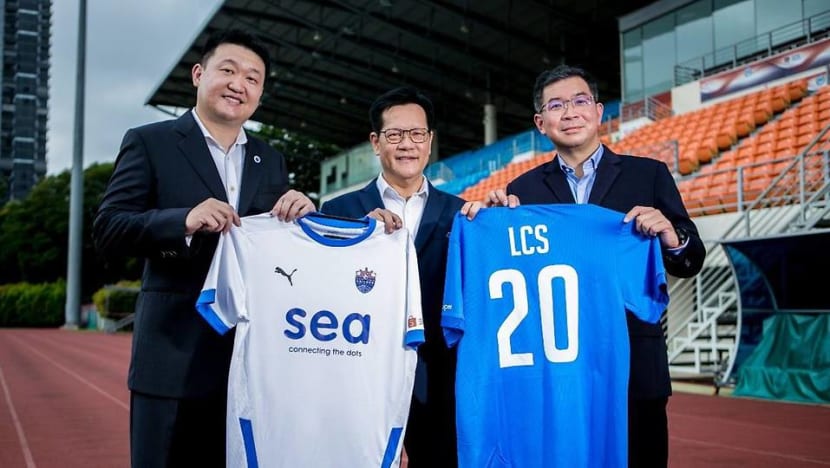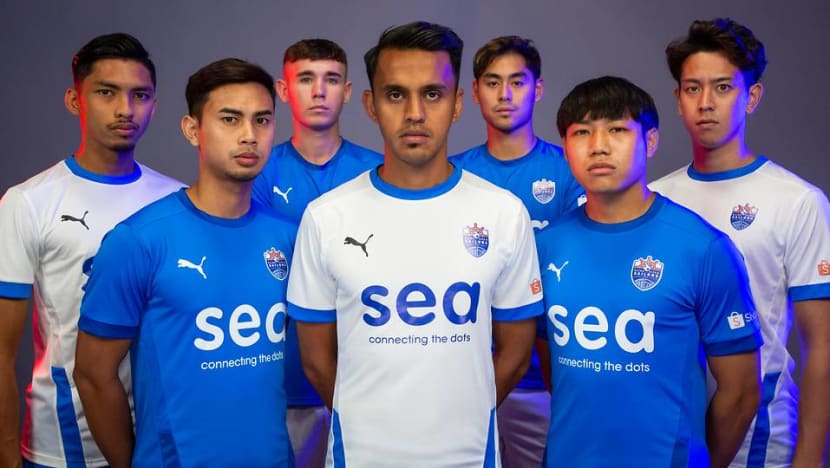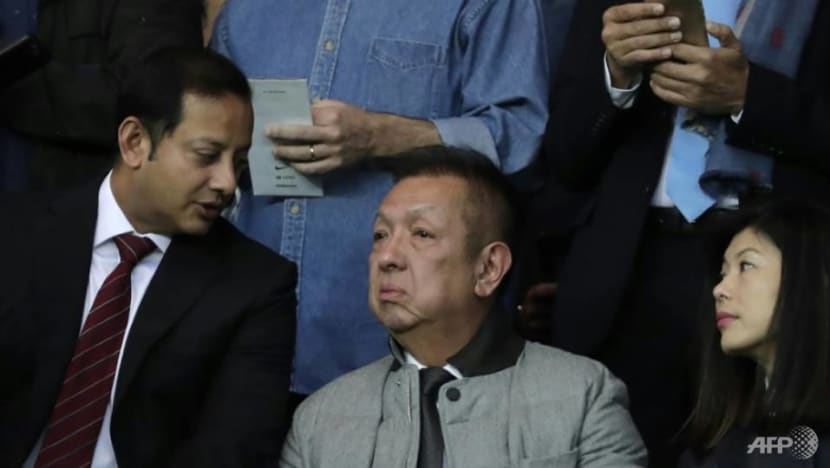commentary Commentary
Commentary: Could Sea Group’s Forrest Li be the next Singaporean owner of a global football club?
Winning the Singapore Premier League could be the first step for Li and his club Lion City Sailors but his ambitions are bigger, says John Duerden.

Forrest Li, Chairman of Lion City Sailors FC, Lim Kia Tong, President of the FAS and Winston Wong, Chairman of Home United, poses with Lion City Sailors FC jerseys (Photo: SEA)
SINGAPORE: In the modern game of football, there are many kinds of club owners with their different motivations and objectives in ploughing money into the game.
In a 2020 study, KPMG, a global professional services firm, produced a study that claimed there were three primary business models that fitted the purchase of professional clubs by companies or wealthy individuals.
The Political Ownership model sees a club giving owners the chance to grow brand awareness or improve public image such as the Qatari and the UAE owners of Paris Saint-Germain and Manchester City, respectively directly or through their sovereign wealth funds.
The Global Ownership model looks to financial gains in terms of potential broadcasting and other revenues. Manchester United’s Glazer family owners was given by KPMG as an example.
READ: Commentary: The football business is changing. Man City is driving it
Then there is the Local Ownership model which sees business people or other prominent figures looking to give back to the community in a bid to salvage or prop up local football heritage. Some of the smaller English Premier League (EPL) clubs like Sheffield United belong to this group.
CONQUERING LOCAL FOOTBALL
At the moment, Forrest Li’s involvement in Lion City Sailors looks to fall into the Local Ownership model, with perhaps a touch of public image benefits from the Political Ownership model as there is little commercial value in the local game for now. That could however change.
There is already plenty happening. In February 2020, Sea Group, the technology company that Li founded and is CEO of and which specialises in e-commerce, digital payments and video gaming, bought Home United, a long-standing and successful Singapore club, changing its name to Lion City Sailors.

Since then, the Sailors have made headlines by smashing the Singapore transfer record that previously stood at S$50,000. In January, the club paid 1.8 million euros (S$2.89 million) to Portuguese club Rio Ave to sign Brazilian midfielder Diego Lopes.
Lopes joined a squad that already looked to be one of the strongest in the league led by experienced Australian coach Aurelio Vidmar and there is no doubt that the Sailors are one of the favourites to win the 2021 Singapore Premier League title.
For the club that is already the talk of Singapore football to then go and win the title would be a major story and perhaps that is the extent of Li’s ambitions.
Born in China and educated in the United States - at Stanford University where he was present in 2005 when Apple CEO Steve Jobs gave a famous graduation speech – Li may be happy simply to inject some cash and breathe some energy into football in Singapore.
READ: Commentary: Singapore has its first multimillion-dollar football signing. But what next?
“As a football fan myself, I believe that Singapore deserves to have a world-class football ecosystem and world-class teams. And for the last several years, I have been honoured to help in developing our local football,” Li said in his first address to fans in February last year.
“We have a clear goal in mind, to build Lion City Sailors into the pride of Singapore. Off the field, we want to build an even stronger football community...and we want to light a spark that will ignite all of Singapore football.”
AND THEN INTO ASIA
If the Sailors can generate excitement and headlines in a league that has sometimes struggled to attract the attention of local fans, then Singaporean football can move to the next level. If so, then it would not do Li’s business any harm in terms of goodwill among citizens and customers of the country who have watched on in envy as other neighbouring leagues such as Malaysia and Thailand have made strides.
That may be welcome news for Li. It is unlikely however that the ambitions of Singapore's seventh richest person – according to Forbes he was worth S$7.1 billion in 2020 - will stop in Singapore, a country of not even six million people.
READ: Commentary: Great that Tampines Rovers is playing with the best in Asia. But what will that do for local football?
“We want to represent our nation with pride in the Asian Champions League,” said Li in 2020. That continental competition would also bring Li’s Sailors and Sea into close contact with clubs, media and sponsors around the continent.
In 2021, Tampines Rovers became the first Singapore club in a decade to appear in the group stages of the Asian Champions League, expanded from 32 to 40 teams this year. The Sailors have a chance of making the 2022 edition with potential games against teams from Thailand, Malaysia, China, Japan, South Korea and India.

Again, success in Singapore and a higher profile in Asia may be enough for Li. It would also give experience to prepare the tycoon to take the biggest step of all: to Europe and the world.
SIGHTS ON EUROPE
He may not want to though. In 2020, Li was asked about whether he would look to invest in European clubs and he remained coy. Doing so could build his brand and enable the company to potentially tap into streams of broadcast and media revenue as the big leagues of England, Spain and Germany are followed by fans around the world.
If Sea wanted to increase its global profile, then buying a club in a major league would provide a short cut - albeit a risky and potentially expensive one – than building the Sailors into a regional club.
Li would not be the first businessman from the region to get involved in European football. The track record has been mixed and others have discovered that there is a fine line between building a global brand or profile and becoming internationally infamous.
For instance, Peter Lim, who made his fortune in, among other products, palm oil, may well rue the day he got involved with Valencia. The Singaporean businessman bought a 70.4 per cent stake in the Spanish club in 2014.

Fans of the six-time Spanish champions have accused Lim of mismanagement and starving the team of funds with numerous calls and protests for him to go home.
At the opposite end of the spectrum there is Aiyawatt Srivaddhanaprabha. In 2010, Aiyawatt’s father Vichai took over Leicester City as CEO of Thai duty free giant King Power. At the time, the East Midlands club was in the second tier of English football. By 2016, Leicester shocked the footballing world by winning the EPL.
READ: Commentary: Peter Lim’s romance with owning a football club appears in trouble
In 2018, Vichai was tragically killed in a helicopter crash as he flew out of King Power Stadium to prompt scenes of genuine sorrow in the city. Under his son, Leicester have continued to prosper and have sat in the top four of the EPL for much of the current season.
Somewhere in between those two examples is Vincent Tan. The Malaysian businessman took control of Cardiff City in 2010 and has overseen two promotions to the EPL and two relegations back to the second tier where Cardiff currently resides.
There is much for Li to consider then if he does decide to move into Europe as success may not always be guaranteed, no matter how deep one’s pockets.
Whatever happens, the first priority is to win the Singapore Premier League and then perform well in Asia. That will be enough for fans in Singapore but it remains to be seen if it is enough for Forrest Li.
John Duerden has lived in Asia for 20 years and covers the region’s sporting scene. He is the author of three books including Lions & Tigers - The History of Football in Singapore and Malaysia (2017).
















